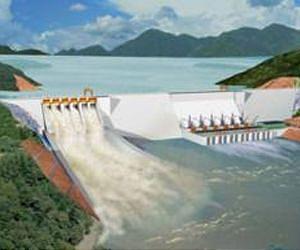Hydropower dams are poised to exacerbate and even outstrip the impact of climate change, according to a report by Finland’s Aalto University and NGO Southeast Asia START.
“Within the next 30 years, hydropower development will have a much greater impact on the Tonle Sap region than climate change, with climate change adding additional ambiguity in predicting water flows,” said Marko Keskinen, one of the report’s authors.
Speaking at a food and water security conference in the capital yesterday, Keskinen called on the Kingdom to consider climate change and hydropower development as interlinked issues.
“They are Wednesday and Thursday,” he said. “Many climate change impacts are felt in society through impacts to the hydrological cycle like floods and extreme weather.”
Cambodia is classified as highly vulnerable to the impacts of climate change, according to the Economy and Environment Program of Southeast Asia, with the UN’s Intergovernmental Panel on Climate Change predicting that extreme precipitation patterns will very likely be more intense and more frequent.
“There is a lack of clarity on the effects of climate change and Cambodia lacks long-term weather data to make a more specific assessment,” Keskinen said. “But the cumulative impact of climate change and hydropower will likely have a huge effect on the flood plain areas . . . which ensures the food security of Cambodia: rice and fish.”
With 14 dams now under construction and another 78 proposed, Cambodia’s energy planning places enormous emphasis on hydropower.
“Hydropower is extremely profitable; Cambodia stands to make millions,” Nathanial Matthews, a geography professor at King’s College London, said at yesterday’s conference.
In a report released earlier this year, the Overseas Development Institute cautioned Cambodia to diversify its energy sources. “Too much reliance on hydropower is unwise, given the impact of climate change on hydropower generation capacity,” the report states.
“Without building climate resilience into designs, dam developers could find the life cycle of their dam drastically shortened,” said Tracy Farrell, executive director of Conservation International.
The Ministry of the Environment acknowledged the need for further study, but several officials declined to comment on exact plans. “We must look at every angle so we can consider possibilities of mitigation if necessary,” said Sao Sopheap, chief of cabinet in the Ministry of Environment.
Source: Phnom Penh Post
